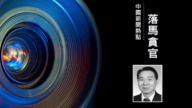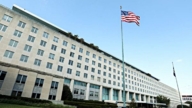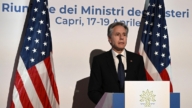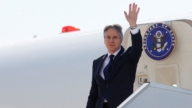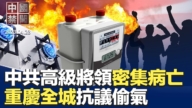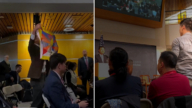【新唐人2013年02月16日讯】围绕钓鱼岛的主权争端,中共态度之强硬和对峙时间之久,令许多人始料不及。不过,有学者表示,中共的强硬态度,与过去一年来高层的权力斗争紧密相关。同时,一项数据显示,去年赴日的外国游客中,中国游客的人数却是历年最多。
继日本方面指称,中共海军舰艇使用火控雷达瞄准日本舰船和飞机后,中共各大军区的海陆空和二炮部队连日来加紧备战。14号,共六艘中国海监船编队继续在钓鱼岛附近海域巡航。而《中央电视台》首次以直播方式,高调曝光船队巡航,以及近距离拍摄钓鱼岛的片段。
日本《共同社》引述日本海上保安厅的消息说,海监50船曾要求附近日本船舰离开钓鱼岛中国领海。
而据《日本新闻网》报导,日本自卫队日前与美国海军陆战队,在加州彭德尔顿基地举行联合夺岛演习,模拟钓鱼岛遭占领后,日美联手夺岛,50名陆上自卫队员更首次搭乘美军鱼鹰运输机进行空降。
北京时政观察人士华颇:“打不起来!所以他们(中共)就高调宣示,一是对内,对内争取民众的支持,表现越强硬国内的民族主义越支持他。对外,有抗衡美日同盟的意味。 估计中日还要恢复以前的‘政冷经热’,在政治上高调喊打喊杀,在经济上还要‘密切合作’。”
《美国之音》的报导引述日本东京大学东洋文化研究所松田康博的话表示,东京都知事石原慎太郎购买钓鱼岛计划,演变成国有化事件,是中日岛屿争端的导火索,但同一时期的中共高层权力斗争和权力交接,激化和深化了中共与日本的矛盾。
松田康博说,中共的权力交接仍在继续,一直到今年三月全国人大开会。一些部门主管官员看着上级的脸色,猜测纷纷,而最终他们选择了强硬政策。因为在权力交接时期,人们往往选择比较强硬的对外政策。
美国中文杂志《中国事务》总编伍凡指出,即使在两会后,中共的内部权斗也一直存在。所以钓鱼岛问题和权斗有关,但不绝对。
美国中文杂志《中国事务》总编伍凡:“更大的(原因)是民族主义。因为老百姓压着他们。民族主义是共产党把它兴起来的,现在老百姓指责你们(中共):你不作为,你就是卖国贼。所以没有一个人敢退步,敢示软。所以民族主义显示出来的力量,可能超过党内斗争。”
与此同时,《央视网》援引日本国家旅游局的数据报导说,2012年赴日的836.8万外国游客中,中国游客约有143万人,为历年最多。
伍凡:“中国老百姓比较理智的去对待日本。不仅看到历史,也要看看现在,究竟日本人对中国是怎么样的。 据我看到一个资料,百分之五十多、六十的日本人,不想跟中国人打仗。你光看一个是共产党喊要打,日本的右派要喊打,美国制止说你们不要打,所以这个战争不一定会打起来。但是叫喊、军队准备要打仗,这个是不会放松的。”
有网友(cooker)认为,央视的这则消息很讽刺:“这脸打的啪啪啪。”
华颇:“反日是一时的。但是这种狂热情绪是保持不了多久的。那种热情一过,当然是一切如常了。该玩还是要玩,该去日本还要去日本。”
中国权利运动发起人胡军:“官方一再反日,喊这么凶,其实民间偏偏这时候愿意到日本去。还有一种情况,就是官员们大量贪污的公款、民脂民膏没地方花,所以现在出去公费旅游的特别多。”
胡军指出,这些中共官员们一方面高喊反日,一方面他又跑到日本去高消费。所以真正的敌对势力、卖国贼,正是这些中共官员。
采访/李韵 编辑/王子琦 后制/李智远
Sino-Japan Islands Dispute Intensifies,
CCP Senior Officers Struggle for Power but Chinese Still Visit Japan
In the territorial dispute over the Diaoyu (Senkaku) Islands,
the tough attitude of the CCP and the long term confrontation exceed what many had expected.
However, scholars have said the CCP’s tough attitude is closely
related to the internal power struggle of the past year.
At the same time, an investigation shows that the number
of Chinese who visited Japan in the last year is higher than in the past.
Since the Japanese said the CCP’s navy had used fire control
radar to target Japanese ships and aircraft,
the entire armed forces of each CCP military region, including
the Second Artillery Force, are engaged in war preparations.
On February 14, six Chinese ocean surveillance ships cruised
around the Diaoyu (Senkaku) Islands.
CCTV also broadcasted live coverage of the cruise,
and a close up view of the Diaoyu (Senkaku) Islands for the first time in history.
Japan Kyodo News quoted the Japan Coast Guard report that
the Chinese Surveillance ship had asked the Japanese ships
to leave China’s territorial waters in the Diaoyu area.
According to the Japan News Network, the Japanese
Self-Defense Force (JSDF) and the U.S. Marine Corps
held a joint resizing island military exercise in
Pendleton base California, U.S..
It was to simulate the two forces resizing the
Diaoyu islands after they had been occupied.
During the exercise, 50 JSDF soldiers did an airborne landing
from a U.S. Osprey transport aircraft, this is a first in history.
Hua Po, Beijing political observer: ”There won’t be a war!
That’s the reason why CCP has declared itself in high profile.
On the one hand, it wants to have
people’s support inside China.
It will have more support from domestic nationalism
if it shows a tougher attitude.
In addition, there has been a demonstration of
an anti US – Japan alliance.
I guess the Sino-Japan relationship will go back to
the political cold, but not in economic considerations.
Politically, the CCP shouts of beating and killing, but
cooperates closely with Japan where economy is concerned.”
The Voice of America quoted Matsuda Compro who is from
the Institute of Oriental Culture, University of Tokyo.
The purchasing of Diaoyu islands plan by Shintaro Ishihara,
the Tokyo Governor, changed into a nationalization event, this lit the fuse of the Sino-Japan islands’ dispute.
But the power struggle of CCP senior leaders and the power
transference itself intensified and deepened the contradictions between the CCP and Japan in the same period.
Matsuda Compro said the CCP’s power transfer can’t be done
before the National People’s Congress in March this year.
Some of the main officials responsible are behaving by
looking straight into their leader’s faces.
Finally, they have chosen a tough attitude. This is because,
during the power transfer, in general, people prefer to choose a relatively tough foreign policy.
Wu Fan, the chief editor of the U.S. Chinese magazine
China Affairs pointed out that even after the two sessions,
the internal struggle within the CCP has remained.
So the Diaoyu Islands’ issue is related to the internal struggle,
although not completely.
Wu Fan: “the greater reason for this state of affairs
is nationalism, which has brought pressure from the people.
Nationalism is created by the CCP. Now the people blame
the CCP: if you don’t take action, you are a traitor.
That’s why nobody dares to step backward,
nobody dares show weakness.
So, the power of nationalism may well exceed
that of the CCP’s internal struggle.”
At the same time, CCTV network quoted data from the
Japan National Tourism Administration that in 2012,
among 8.368million foreign visitors,
there were about 1.43 million Chinese.
This is the largest figure recorded in history.
Wu Fan: “Chinese people are treating Japan with rationality.
They balance history and today to judge what attitude Japanese people have toward China.
I have read data that claims that over 50%to 60% of Japanese
don’t want to fight with the Chinese.
The CCP has shouted to fight and the right-wing of Japan
talks about fighting, but the U.S. said don’t fight.
So there shouldn’t have been any likelihood of war.
But the shouting and military preparation have
gained momentum and won’t be easily stopped.”
Some netizens thought CCTV’s message very ironic.
“The slap in the face made a loud noise.”
Hua Po: “Anti-Japanese tirades are a temporary action.
This kind of enthusiasm can’t last for a long time.
When the enthusiasm is gone,
everything will go back to normal.
When people want to travel for fun, they will travel.
Those who need go to Japan will go,
regardless of the situation.”
Hu Jun, founder of China Human Rights Campaign:
“The CCP repeatedly encourages anti-Japanese feeling,
the shouting is so fierce, but people still went to Japan.
There’s another fact. Lots of officials have embezzled
so much money from people, but don’t have a place to use it.
Then there are so many people who travel out of China
by spending public funds.”
Hu Jun, found of China Human Rights Campaign pointed out
that CCP officials shouted anti-Japan on the one hand,
but they traveled to Japan and spent a lot of money there.
So it’s very clear that the real hostile forces and traitors
are those CCP officials.





